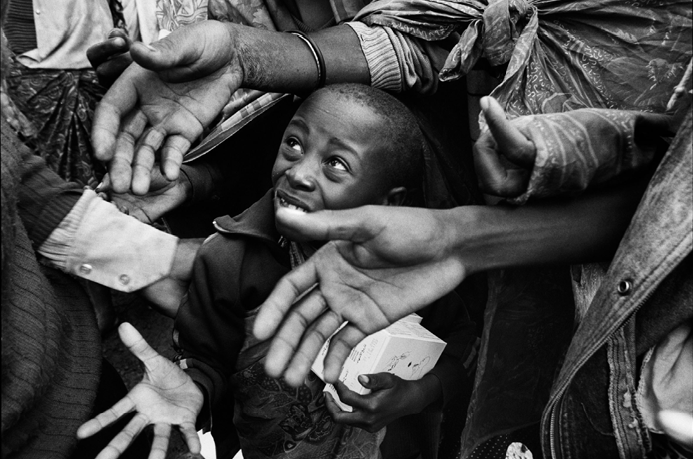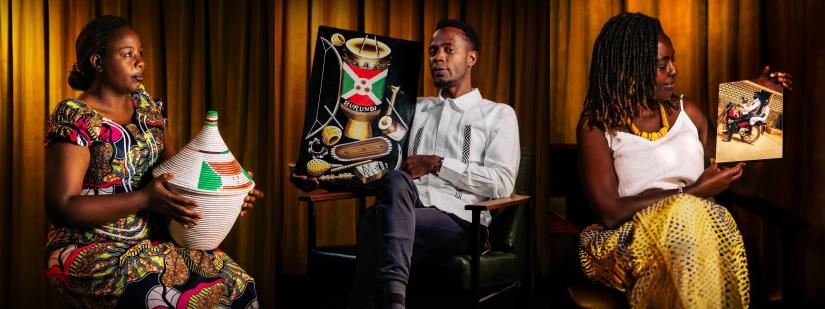Bear witness, listen and remember. At UTS Central, 12 Nov - 23 Nov.

Photo by Stephen Dupont
2024 marks 30 years since the Genocide of the Tutsi people in Rwanda in 1994. This sensitively curated exhibition invites us to remember, understand and reflect on the tragedy of this event 30 years on, and honour the enduring spirit of the survivors who live beyond.
The UN International Criminal Tribunal for Rwanda estimates that Hutu extremists massacred between eight hundred thousand and one million men, women and children over three months in 1994. They targeted Tutsi civilians and moderate Hutus. It was the horrific result of decades of tribal resentment, exacerbated by colonialism and post-colonial power struggles.

Rwanda 30+ Bearing Witness to Genocide
with Baho: Stories of Resilience and Determination
12 Nov 2024 - 23 Nov 2024 (Mon – Fri)
Foyer, UTS Central (Building 2), 61 Broadway, Ultimo NSW 2007
Head On Photo Festival 2024, SBS Dateline and UTS Faculty of Arts and Social Sciences
This exhibition explores the tragedy with images taken in Rwanda in 1994 by acclaimed photojournalist Stephen Dupont, alongside original video footage from SBS Dateline’s 1994 program reporting. Emerging portrait photographer Martina Reyes Guilmant presents 'Baho: Stories of Resilience and Determination’, a series of colour portraits and video interviews of survivors in contemporary Australia, whose stories and images of healing and resilience highlight hope and new beginnings.
This exhibition examines what it is to bear witness to conflict events like these, and the crucial role in documenting, remembering, and sharing the story with the public so it can never be denied.
International media played an important role in bearing witness to these atrocities. Stephen Dupont was one of the first photographers to enter Rwanda with the Rwandan Patriotic Front to document the slaughter and his powerful images bear witness to a ferocious killing frenzy.
The horrific impact of the spread of media disinformation, misinformation, and hate speech is here too. Public and private Rwandan media propaganda fueled the catastrophic violence and the ‘Propaganda Machine’ QR exhibit samples some of the 1994 Rwandan French and local dialect radio and print campaigns.
Meanwhile in 'Baho: Stories of Resilience and Determination’ we meet survivors living in Australia today. “Baho” means “to live” and Martina Reyes Guilmant’s portraits of Chantal, Jean Paul, Agnes, Nadine and Vivens capture the essence of people who have suffered unimaginable loss yet have found the strength to live on and rebuild. This is the + in Rwanda30+.

Photos by Martina Reyes Guilmant
As co-founders of Kumva and Kwibuka (Listen and Remember) they teach into high schools and workplaces, telling their stories in the hope to nurture a more empathetic and compassionate Australia. Here they invite us to reflect with them and to honour the loss of their families and friends. They are the living witnesses whose memories, stories and expressions of grief are key to understanding, healing and resilience.
Rwanda30+ is co-curated by UTS Journalism Fellow Helen Vatsikopoulos and Head On Festival Founder and Creative Director Moshe Rosenzveig OAM. It is presented in partnership with SBS Dateline with support from the UTS Faculty of Arts and Social Sciences. Photography from Stephen Dupont and Martina Reyes Guilmant. In collaboration with survivors from Kumva and Kwibuka.
The exhibition runs Monday to Friday from 12 November until 23 November in the foyer of UTS Central (Building 2), 61 Broadway, Ultimo NSW 2007.
More Info:
Rwanda 30+ Head On Public Exhibition – UTS - 12 Nov to 23 Nov (Mon to Fri)
Stories of Resilience Head On Public Exhibition – UTS - 12 Nov to 23 Nov (Mon to Fri)
About the Head On Photo Festival 2024
Head On is Australia’s premier non-profit organisation for photography, producing the esteemed annual Head On Photo Festival in Sydney and a year-round program of events and collaborative projects. Celebrating all photography forms, the Festival draws over 400,000 visits, featuring 900+ Australian and international photographers in innovative exhibitions in galleries, public outdoor spaces, cafes, and projections. It’s a hub for emerging and established talent, fostering innovation via exhibits, conversations, workshops, and collaborations. More information.
About Kumva and Kwibuka
Kumva and Kwibuka is a group of Rwandan survivors of the 1994 genocide against the Tutsi and professional educators who deliver an education program with school students, teachers and community organisations. “The messages of our program are universal: to teach the importance of compassion and empathy. Genocide always begins with exclusion and our program is built on the principle of inclusion. We create a safe space for dialogue between the audience and the genocide survivor speakers. Our program also teaches about individual and collective responsibility.Our survivors also celebrate the opportunities they have been offered here in Australia that many of us take for granted. We end our program with a positive message about the resilience of our survivors and the importance of creating a loving family and an open and accepting community.” More info about the Education program and meet the Team.
Chantal Bunani is a survivor and co-founder of Kumva and Kwibuka. Recently she shared her story with Frances Du (UTS Journalism) for SBS Dateline:
She faced 100 days of terror when just 13. Now in Australia, Chantal tells of her escape
Content warning and support contacts
CONTENT WARNING: This exhibition is a respectful commemoration of the 30 year anniversary of this tragic event. It interrogates the role played by the media and also invites guests to hear from survivors living in Australia today, to remember with them, and listen to their stories of resilience and healing. Some elements of this exhibition depict sensitive and potentially distressing images, video and audio of paramilitary acts of murder and violence against men, women and children. If this content is distressing, please find support available via the following:
- UTS students UTS Counselling
- UTS staff TELUS Health TELUS Health: 1300 361 008
General Public:
- Trauma specialist counselling for refugee survivors available through STARTTS
- For people affected by overseas conflicts the Witness to War national multilingual telephone hotline is a free call number 1800 845 198
- Lifeline 13 11 14 (24 hours)
- NSW Mental Health Line on 1800 011 511
- The UTS Psychology Clinic is a not-for-profit teaching and research clinic that provides quality services to the community at a low cost.
- There is also a variety of other cross-cultural mental health services via this site.

